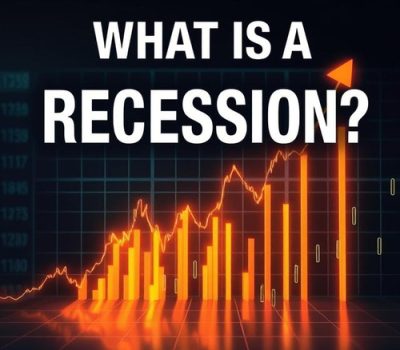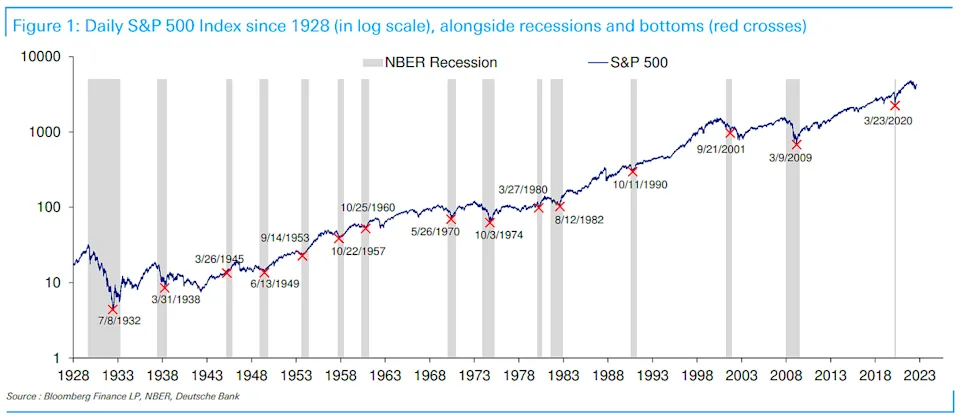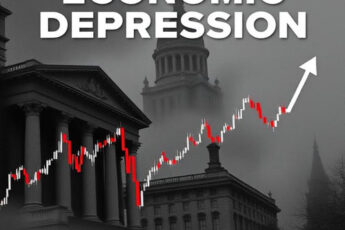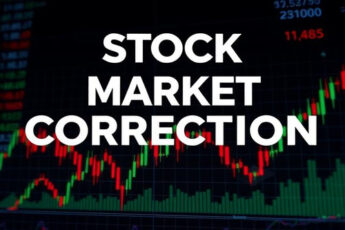
The whispers have grown louder in recent months. Financial news shows feature increasingly concerned analysts. Your social media feed is peppered with doom-scrolling economic predictions. Is a recession really looming in 2025, and if so, what does that mean for you?
In this Recession guide, we’ll break down this often-misunderstood economic phenomenon, equipping you with the knowledge to navigate any potential downturn with greater confidence.
WHAT ACTUALLY IS A RECESSION?
A “recession” isn’t just a bad economic day, week, or even month. Technically speaking, the most widely accepted definition is two consecutive quarters of negative GDP growth. In plain English? The economy shrinks for at least six months straight.
But this clinical definition barely scratches the surface of what recessions mean in real life:
- Businesses often reduce spending and freeze hiring.
- Unemployment typically rises as companies cut costs.
- Consumer spending usually decreases as people become more cautious.
- Investment values may decline significantly.
- Credit becomes harder to obtain
Each recession has its own fingerprint. The 2008 financial crisis looked very different from the pandemic-triggered downturn of 2020. And any potential 2025 recession will have its own unique characteristics based on today’s economic landscape.
A BRIEF LOOK AT HISTORY
Recessions are a natural part of the economic cycle. Since World War II, the U.S. has experienced about 12 recessions, each triggered by different factors—oil shocks, financial crises, pandemics, or aggressive interest rate hikes.
Let’s take a look at a few key examples:
2008 GLOBAL FINANCIAL CRISIS
Triggered by the housing bubble’s collapse and risky mortgage lending, this led to a 4.3% drop in GDP and an unemployment rate that peaked at 10%.
2020 COVID-19 RECESSION
One of the sharpest but shortest in U.S. history. The economy contracted by 31.4% (annualized) in Q2 2020. However, massive stimulus and rate cuts helped drive a quick recovery.
2022-2023 SLOWDOWN
High inflation (peaking at 9.1% in June 2022) and interest rate hikes by the Federal Reserve brought fears of a recession. The stock market saw the S&P 500 fall by over 25%, and the tech-heavy Nasdaq tumbled more than 35% from its peak.
ARE WE HEADING INTO A RECESSION IN 2025?
As we move through 2025, several economic indicators have economists raising eyebrows:
- THE INVERTED YIELD CURVE
When short-term government bonds yield more than long-term ones, it has historically signaled recessions. This indicator has flashed warning signs intermittently throughout 2024. - INFLATION CHALLENGES
After the post-pandemic inflation surge, the Federal Reserve’s aggressive interest rate policy has created new pressures on businesses and consumers. - HIGH INTEREST RATES
After aggressive rate hikes to tame inflation, borrowing costs remain elevated. This could slow down home buying, car loans, and business expansions. - SLOWER JOB GROWTH
While unemployment is still historically low (hovering around 3.9% in early 2025), hiring has slowed in tech and finance. - TECH SECTOR VOLATILITY
Technology stocks have shown increasing instability following years of astronomical growth, potentially signaling broader market concerns. - HOUSING MARKET STRAINS
With higher mortgage rates than historical averages, housing market activity has cooled significantly in many regions.
However, it’s not all doom and gloom. Remember that recessions are normal parts of economic cycles. The economy expands, then contracts, then expands again—it’s been happening for centuries. Plus, the Federal Reserve can adjust rates if signs of deeper distress appear.
Additionally, not everyone experiences recessions the same way:
- Some industries tend to be more recession-resistant (healthcare, utilities, basic consumer goods).
- Geographical impacts vary widely based on local economic diversity.
- Individual financial situations create vastly different experiences.
- Recessions create opportunities alongside challenges

HOW DOES A RECESSION AFFECT YOU?
The apprehension surrounding recessions is understandable. They can have tangible effects on our daily lives. During a recession, you might notice:
- Job Insecurity: Companies often freeze hiring or lay off workers.
- Stock Market Volatility: Markets tend to drop as investor sentiment turns negative.
- Investment Declines: Stock market values often fall during recessions as company earnings are projected to decrease. Retirement accounts and other investments can take a hit.
- Higher Loan Defaults: Credit card debt and missed mortgage payments tend to rise.
- Lower Consumer Confidence: People cut back on spending, impacting business revenue.
- Business Closures: Smaller businesses, in particular, can struggle to survive a prolonged period of reduced demand and tighter credit conditions.
- Increased Financial Strain: Individuals and families may face greater difficulty managing debt and meeting financial obligations.
YOUR RECESSION PREPARATION TOOLKIT
Rather than panic, channel your energy into concrete preparation:
- Build Your Emergency Fund
The golden rule of recession-proofing is having liquid savings. Aim for 3-6 months of essential expenses in an accessible account. Consider stretching toward 6-9 months for extra security if you’re in a volatile industry. - Reduce Debt
High-interest debt can be a significant burden, especially during a recession. Focus on paying down debts to improve your financial situation. - Diversify Income Sources
Relying on a single income can be risky. Consider creating multiple streams of income, such as freelance work, investments, or part-time jobs. - Create a Realistic Budget
Understanding your income and expenses is crucial for managing your finances effectively, especially during economic uncertainty. Identify areas where you can cut back if needed. - Stay Invested, But Stay Smart
Don’t panic sell your investments. Historically, markets have always bounced back. Recessions can be a great time to dollar-cost-average into high-quality stocks. - Review Your Investments
This isn’t about panic-selling but ensuring your portfolio aligns with your time horizon and risk tolerance. If you’ve been meaning to rebalance, now’s the time. - Stay Informed, Not Panicked
Keep abreast of economic news from reputable sources, but avoid letting fear-mongering headlines dictate your financial decisions. - Upskill and Network
Recessions often reshape job markets. Use this time to gain new skills or certifications that can increase your job security or help you pivot careers if needed. - Consider Professional Advice
If you’re feeling overwhelmed or uncertain, consulting with a qualified financial advisor can provide personalized guidance tailored to your specific situation.
THE PSYCHOLOGICAL GAME
Perhaps the most underrated aspect of navigating recessions is managing your mindset. Economic downturns trigger powerful emotions—fear, anxiety, and sometimes irrational decision-making. Maintain perspective by:
- Limiting consumption of sensationalist economic news.
- Focusing on factors within your control.
- Remembering that recessions are temporary.
- Recognizing that preparation beats panic every time.
THE TAKEAWAY: KNOWLEDGE IS YOUR BEST DEFENSE
Whether the economic clouds of 2025 bring a light shower or a downpour, understanding what recessions mean and how to weather them gives you a powerful advantage. Economic cycles have existed since the dawn of modern economies and will continue long after current concerns have passed.
By understanding what it is, recognizing the potential impacts, and taking proactive steps to prepare your finances, you can navigate these shifting sands with greater resilience. Remember, economic downturns are often followed by periods of recovery and growth. Staying informed, being prepared, and maintaining a long-term perspective are your best defenses against the uncertainties of the economic landscape in 2025 and beyond.
Remember: The best time to prepare for challenging economic times is before they arrive. Your future self will thank you for the foresight.





Leave a Comment